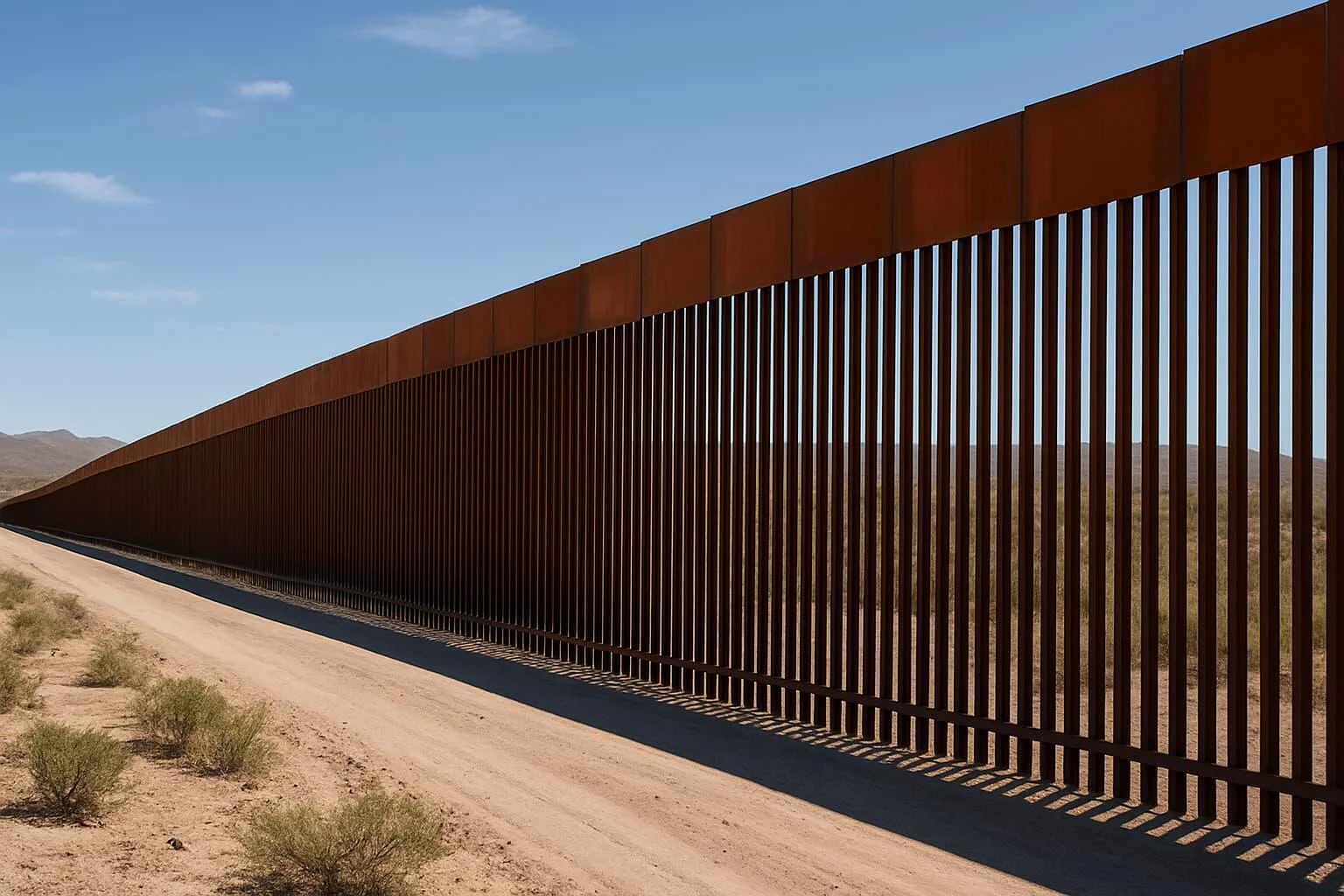As far as I can recall there was never an overwhelming demand on the part of the American people for our government to build a stronger, higher, and costly wall between the US and Mexico. At least not until Donald Trump surprisingly announced that building such a barrier between our two nations was a priority for his administration. As you will be likely to remember Trump placed this urgent need in the context of the allegedly criminal acts brought about by an influx of Mexicans who entered the country illegally.
The fact that there is no documentation of the veracity of this claim has not prevented large numbers from still believing it to be so. This only goes to affirm the efficacy of one of Trump’s political tactics, if you throw enough fecal matter around a good amount is bound to stick.
This is not to suggest that the matter of immigration, especially from Latin America, is not a complex issue that confronts both the Federal authorities and the governments of those states that share borders with our southern neighbor. All nations have the right to set policies and procedures regarding who can establish residence within its borders. Although by and large we have imagined ourselves to be a welcoming destination, obviously this has not always been the case. In fact, we have almost always been ambivalent about who we want to join us. Our history will reveal that many Americans strongly prefer white Christians, preferably those who already speak English. And I imagine if they have no or little foreign accent all the better
Of course, each of the southern border states historically has had large populations of people of Mexican descent who have lived there for many generations and who likely think of themselves as Americans. But the truth is not all are here legally. There is no evidence, however, to support the outrageous claim that those who are not are “poisoning” the blood of America to quote Trump. I would have hoped that this comment would have been immediately condemned as racist and false but as a harbinger of things to come the Republican party was largely silent.
There was little if any reaction from allegedly decent and compassionate leaders of this party and to me that speaks volumes about the current nature of the Republican controlled Congress.
There are many factors that impact upon a nation’s immigration and refugee policies. The agricultural industry is significantly dependent on the labor of foreign workers, many of whom are what some call illegal and others define as undocumented and there is much evidence that such newcomers are not always welcomed in those communities where they have relocated for their livelihoods or even for those who have come here to escape crime or in many cases political violence. Yes, it is true that there are examples of communities where an influx of non-English speaking low income new-comers have taxed the ability to house or educate large numbers of new residents but it is equally so that the MAGA community rarely accepts that helping with such services is a federal responsibility.
Too many are reluctant to acknowledge that racism and xenophobia still play a role in how many Republicans elected official view a welcoming and compassionate immigration policy. And for those of us who are Jewish, we should never forget that many of our co-religionists were left to die in the Holocaust since the US established very limited quotas for the nations from which Jews were desperate to escape while favoring places in northern and western Europe. So, it was not so surprising that Trump expressed his preference for those rare refugees from Nordic countries and more recently white South Africans. Nor was it unexpected that this ugly statement received little if any opposition from the political party that now follows him like lemmings. Although it is a myth that lemmings will mindlessly follow their leader until they fall off cliffs to their deaths. It seems that rodents have better judgement than millions of American voters.
The border wall is clearly one of Trump’s obsessions but not the only one with which we should be concerned. There were many reasons that those who created our nation and its foundational laws established what they probably thought of as a well-defined separation of authority and power within our government. Since they came here from nations in which the head of government was an absolute monarch, they well understood the dangers of one person being able to determine how the people could worship but also what to believe and when to go to war and against whom. The concepts of freedom of expression of association, of the press and even of dress were too often alien in their countries of origin and often thought of as counter of the greater good. Violators were severely punished. Furthermore, most of the “founding fathers” believed that only the Congress, the reflection of the will of the citizens, should commit our military to fight against another nation and so they included it in the U.S. Constitution
However, throughout history, our armed forces have engaged in numerous military actions without a formal Congressional declaration of war. While we refer to the Korean War as a “war”, one in which approximately 40,000 members of the US military were killed, it was classified as only a “police action.” Likewise, the war in Viet Nam was not a declared war either but estimates of American military deaths number 60,000
This motivated debates about the limitations of presidential power and the resultant passage of the War Powers Resolution of 1973, which attempts to regulate the President’s ability to commit troops to armed conflict. It contains language that requires the President to notify Congress within 48 hours of committing any troops to military action and to withdraw them after 60 days absent Congressional approval. While several presidents have found ways around this requirement numerous members of Congress, even of the President’s own party, have raised strong objection to sending troops into conflict without even Congressional debate
But as we see each day Trump does not believe he needs Congressional approval for very much, perhaps for anything, and given the acquiescent behavior of the current Congress he is correct. He once suggested that in the future we may no longer need elections. He may well believe that we do not need a legislative branch of government either or even a judicial branch either. And the fact that no Republican House member voted to release the full Epstein files, very likely out of fear that Trump might be mentioned in them, is very revealing. Someday someone could write a book about the 119th Congress called Profiles in Cowardliness.
There is a term called “mission creep” referring to the tendency by an organization, agency or even a department to reach out beyond its intended mandate. We now have a President who exhibits a profound case of authority creep in which he believes that he has the right to create governmental departments, destroy others like the Department of Education or the Environmental Protection Agency and at the very least cripple others or deplete and gut staff thus making what he does not wish them to do ineffective and irrelevant. As you know, he has ordered the crippling of systems of providing health care and much needed social services for many millions. Furthermore, his establishing tariffs on imports from all over the world often seems based upon his whims or dislikes of certain foreign leaders. For all we know it is based upon which cuisine he enjoys.
While nearly all other presidents have resorted to executive orders to side step Congress to force Federal agencies to do his bidding Trump began to significantly reshape government the day he took office. Separation of powers be damned. His blanket pardons of the violent gangs who attacked Congress on January 6th including calling for the lynching of Vice President Pence were extraordinary. Even more so because these Trumpites were able to construct gallows on the grounds of the US capitol while chanting “hang Mike Pence’ was terrifying. Did either the President or J.D. Vance, condemn those committing the terrorizing of members of Congress, attacking and injuring government security officials, destroying government property or calling for the killing of the man Trump chose to be his back up in running the nation? Not that I know of.
And his ordering the dismissal of criminal charges against Democratic NY Mayor Eric Adams apparently in exchange for his cooperation in Trump’s deportation campaign would have been astonishing if undertaken by any other President. No doubt you can come up with other equally astonishing examples of Trump’s expansion of Presidential powers. Perhaps I should stop here to make you stop crying too hard.
But from the rubber stamp nature of even the Supreme Court of the US he may well think they are extraneous as well. He has made it obvious that he sees the US Department of Justice as being answerable to his whims and emotional needs. And where is the rare pushback from even Republican state legislators whose constituents are suffering from the ill-advised, cruel and heartless cuts coming from the current administration in critical social services? Is the possibility that Trump will recruit someone to run against them in a Republican primary sufficient to make them give up the last drop of dignity and independence, it certainly looks that way.
This brings me to one last supposed wall, that being the wall of separation between religion and government. Frankly, as a non-lawyer I have long thought that this supposed highly limited relationship between government and faith-based entities to be somewhat murky. For example, why are my synagogue dues tax exempt? Why is a clergy person’s monetary housing allowance, called a parsonage allowance, excludable from gross income for income tax purposes? But even with these minor exceptions most Americans seem to have felt that what was commonly referred to as a separation between church and state was not only appropriate but probably even a protection based in the Constitution.
In fact, this principle is not in the Constitution at all. It was first publicly expressed by Thomas Jefferson when he used the phrase “wall of separation between church and state” in an 1802 letter to a group of Connecticut Baptist clergy. In it, he attempted to explain that he was not in any way opposed to religious beliefs but was concerned that unlike in England and in much of Europe such beliefs should not interfere with or influence what was the appropriate role of government.
Jefferson was far from alone in his profound discomfort by which the head of state, the monarch, was most often also the head of the official national religion. Ever since 1558 the King or sometimes the Queen of England has appointed all the senior clergy with the input of the Prime Minister. You can be assured allegiance to the crown was a major factor in the selection.
Without going into English history, bear in mind that the creation of this official state religious denomination, called not surprisingly the Church of England, came about when in 1534 King Henry VIII, who wished to annul his marriage to Catherine of Aragon, was denied the ability to do so by the Pope’s refusal to grant the annulment. So, Henry simply took total authority over the English church and declared himself its Supreme Head, a title he probably created for himself and possibly one envied by our current President.
Later, Henry’s daughter, Queen Mary, who remained loyal to the Vatican, decided that Catholicism should once more be declared the only legal faith in England. So, she mounted a deadly war on British Protestantism in which many of the adherents of the church founded by her father were burned at the stake.
Throughout the centuries US courts protected against too much of the incursion of religious belief in government although there are clearly exceptions such as the establishment of a Congressional chaplain who is paid for out of the Federal budget. These chaplains perform duties such as opening sessions with prayer, providing spiritual counseling to the members, leading Bible studies and prayer meetings for house members and their staffs.
But most Americans probably long believed that this wall was just about sacred and numerous court decisions made religious bodies and officials gun shy when it came to allowing a religious nose of the proverbial camel under the tent.
This was especially so within the Baptist church, partially due to that denomination’s history of being an unpopular minority faith in much of the world. Ironically it was both Baptist and Jewish bodies that often went to court to prevent what they felt were politically inspired threats to church state separation. It is also possible that since both Jewish and Baptist congregations are dependent on the financial support of their membership the fear of clergy taking a position that might be counter to the wishes of congregants was a motivation to stay clear of politics. From my working with numerous rabbis, it was my experience that they would often use the legal prohibition of intertwining especially partisan comments with their rabbinic role as a reason to avoid even the slightest appearance of political partisanship.
But now we seem to live in a time of a very different mindset. In what may have been a surprise to those who have not paid attention to Trump’s desire to court, empower and activate the more socially conservative and politically right wing faith community, the IRS, whose leadership was appointed by the POTUS, has just ruled that the ban on political expression in houses of worship is no longer in effect and their clergy can now even endorse candidates for public office from the pulpit or in writing. Somewhat ironically Jesus seems to be more of a liberal than not, regarding several social policy issues. He is quoted in various books of the “New Testament” as it being easier for a camel to pass through the eye of a needle than it is for a wealthy person to enter heaven. One cannot help but wonder what the billionaire class that might claim the importance of their Christian values would tell Christ if they came before him seeking salvation.
The IRS’s announcement of this major change in policy explained that any advocacy on behalf of a candidate was the equivalent of “a family discussion concerning candidates.” It has been widely understood that any tax-exempt organizations, which includes churches, synagogues, temples, mosques etc. as well as charities such as Jewish federations were prohibited from endorsing candidates, raising, or contributing funds on behalf of political campaigns. The truth is that while very few religious entities blatantly violated either this law and even fewer were punished if they did so. Most close observers believe that especially the more conservative denominations and clergy will have a field day by raising funds for their favorite candidates, endorsements for anti-reproductive choice politicians and those opposed to the rights of LGBT people. And should it surprise anyone if candidates see especially Orthodox synagogues as sources of support— both financial as well as political— for them in return for support for Israel? As readers of the DJOP newsletters know, I often quote my father who raised me to be something of a “political junkie” and a strongly committed Jew. He would often say in evaluating a politician or a governmental action “is it good for the Jews?” In this case I believe the answer is obvious.


